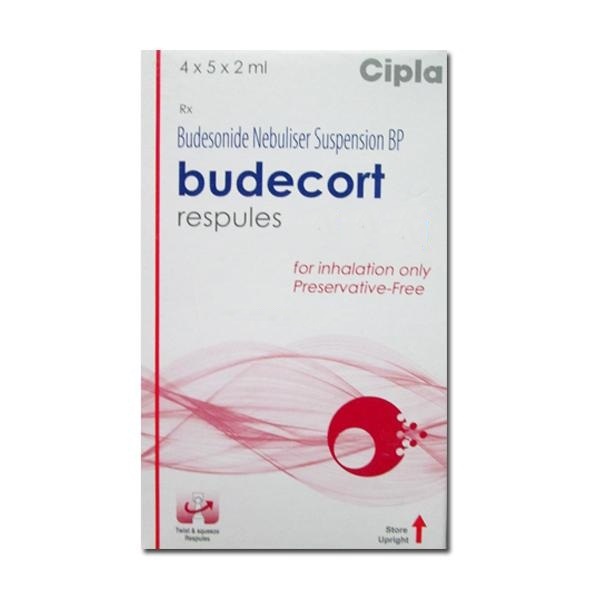Budecort Respules 1mg/2ml
Budecort Respules 1mg/2ml is a corticosteroid inhalation solution containing budesonide, designed to manage asthma and chronic obstructive pulmonary disease (COPD). Delivered via a nebulizer, it reduces airway inflammation, easing breathing difficulties. Ideal for patients unresponsive to inhalers, it minimizes symptoms like wheezing and shortness of breath.
Regular use helps prevent asthma attacks but is not for acute relief. Possible side effects include throat irritation, cough, or fungal infections. Rinse mouth post-use to prevent oral thrush. Consult a doctor for dosage adjustments. Store in a cool, dry place away from sunlight. Not a cure—consistent use ensures optimal lung health.
Uses
- Asthma Management – Helps control chronic asthma by reducing airway inflammation and preventing flare-ups.
- Chronic Obstructive Pulmonary Disease (COPD) – Aids in managing COPD symptoms like breathlessness and wheezing.
- Bronchial Inflammation – Reduces swelling in the airways, making breathing easier.
- Preventive Therapy – Used regularly to prevent asthma attacks, not for immediate relief.
- Allergic Respiratory Conditions – Helps manage respiratory allergies and eosinophilic bronchitis.
How to Use Budecort Respules 1mg/2ml ?
- Preparation: Wash hands thoroughly before handling the respule. Shake the respule gently.
- Open the Respule: Twist off the top of the single-dose respule.
- Nebulization: Pour the liquid into the nebulizer chamber. Attach the mouthpiece or mask.
- Inhalation: Breathe in deeply through the nebulizer until the mist is completely inhaled (usually takes 5-10 minutes).
- Post-Use Care: Rinse mouth with water to prevent oral infections like thrush. Clean the nebulizer after use.
How dose it works ?
Budecort Respules 1mg/2ml contains budesonide, a corticosteroid that reduces airway inflammation and swelling. It works by inhibiting the release of inflammatory substances like histamines and cytokines, preventing airway constriction. This helps in relieving wheezing, breathlessness, and chest tightness in asthma and COPD patients. Unlike bronchodilators, it doesn’t provide immediate relief but controls symptoms over time with regular use. By reducing hypersensitivity in the lungs, it lowers the frequency and severity of asthma attacks, ensuring better long-term respiratory health.
Dosage
The dosage varies based on age, severity of the condition, and medical advice. Always follow your doctor's prescription.
- Adults & Adolescents (12+ years): Usually 0.5–2 mg per day, divided into one or two doses.
- Children (6 months – 12 years): Typically 0.25–1 mg per day, as prescribed by a doctor.
- Maintenance Dose: Adjusted based on response; minimum effective dose is preferred.
Benefits of Budecort Respules 1mg/2ml
- Reduces Airway Inflammation – Helps control swelling in the lungs, making breathing easier.
- Prevents Asthma Attacks – Regular use lowers the frequency and severity of asthma symptoms.
- Manages COPD Symptoms – Eases breathlessness, wheezing, and chronic cough in COPD patients.
- Non-Invasive Treatment – Delivered via nebulizer, ideal for children and those struggling with inhalers.
- Long-Term Respiratory Health – Provides sustained relief, improving lung function over time.
- Minimal Systemic Side Effects – Acts directly on the lungs, reducing overall steroid exposure.
Side Effects of Budecort Respules 1mg/2ml
While generally well-tolerated, some users may experience:
Common Side Effects:
- Throat irritation
- Coughing
- Hoarseness of voice
- Dry mouth
- Mild nausea
Less Common but Serious Side Effects:
- Oral thrush (fungal infection in the mouth)
- Difficulty breathing (rare)
- Facial swelling (allergic reaction)
- Headache or dizziness
- Delayed growth in children (with long-term use)
Precautions
- Use as Prescribed: Do not exceed or reduce dosage without medical advice.
- Rinse Mouth After Use: Prevents oral thrush and infections.
- Monitor Growth in Children: Long-term use may affect growth; regular check-ups are essential.
- Avoid Contact with Eyes: Can cause irritation if accidentally exposed.
- Inform Your Doctor: If you have tuberculosis, infections, or liver disease.
- Not for Acute Attacks: Does not provide immediate relief; use a rescue inhaler if needed.
Frequently Asked Questions
What is Budecort Respules used for?
Budecort Respules is used to treat asthma, chronic obstructive pulmonary disease (COPD), and other respiratory conditions by reducing airway inflammation.
How should I use Budecort Respules?
Use it with a nebulizer as prescribed. Pour the liquid into the nebulizer chamber and inhale the mist deeply until finished. Rinse your mouth afterward.
Can Budecort Respules be used for quick relief?
No, it is a preventive medication. For immediate relief during an asthma attack, use a fast-acting bronchodilator as prescribed.
Are there any side effects?
Common side effects include throat irritation, cough, hoarseness, and oral thrush. Rinse your mouth after use to reduce risks.
Can children use Budecort Respules?
Yes, but only under a doctor's supervision. Dosage depends on age and severity of the condition.
How long does it take to work?
It may take a few days to weeks for full effects. Regular use is necessary for long-term benefits.
Can I stop using Budecort suddenly?
No, stopping suddenly may worsen symptoms. Always consult your doctor before discontinuing or adjusting the dose.
Is Budecort safe during pregnancy?
Consult your doctor before use. It is generally considered safe, but benefits and risks must be assessed.
Can Budecort be used with other medications?
Inform your doctor about any other medications you are taking to avoid interactions.
How should Budecort Respules be stored?
Store in a cool, dry place away from direct sunlight. Keep out of reach of children.
Conclusion
Budecort Respules 1mg/2ml is an effective corticosteroid treatment for asthma and COPD, reducing airway inflammation and preventing symptoms. While it does not provide immediate relief, regular use improves long-term respiratory health. Proper usage, dosage adherence, and precautions help maximize benefits while minimizing side effects. Always follow medical advice and rinse your mouth after use. Consistency is key to maintaining better lung function and improving overall quality of life.
Your review is submitted successfully. It will be live after approval, and it takes up to 24 hrs.






